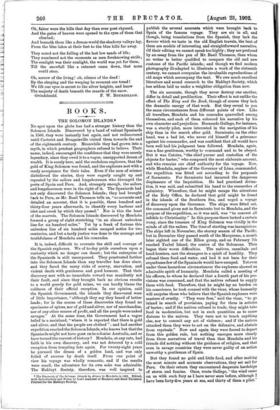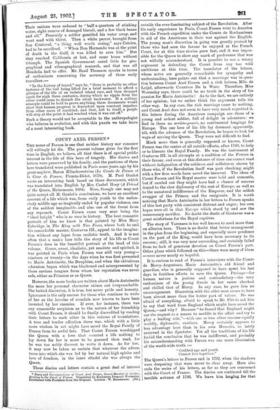BOOKS.
THE SOLOMON ISLANDS.• No spot upon the globe has had a stranger history than the Solomon Islands. Discovered by a band of valiant Spaniards in 1568, they were instantly lost again, and not rediscovered until Carteret and Bougainville visited them towards the end of the eighteenth century. Meanwhile they had grown into a myth, in which prudent geographers refused to believe. Their name, indeed, encouraged the confidence that they were merely legendary, since they owed it to a vague, unsupported dream of wealth. It is surely here, said the credulous explorers, that the gold of King Solomon was found, and the explorers met with a ready acceptance for their tales. Even if the men of science disbelieved the stories, they were eagerly caught up and repeated by the sailors and longshoremen who thronged the ports of Spain and Peru. And, strangely enough, the sailors and longshoremen were in the right of it. The Spaniards had not only discovered the Solomon Islands ; they had brought Lack to Peru, as Mr. Basil Thomson tells us, "so accurate and detailed an account, that it is possible, three hundred and thirty-four years afterwards, to identify every harbour and islet and creek by which they passed." Nor is this the least of the marvels. The Solomon Islands discovered by Mendaiia formed a group of eight stretching " in an almost unbroken line for six hundred miles." Yet by a freak of fortune this unbroken line of six hundred miles escaped notice for• two centuries, and but a tardy justice was done to the courage and truthfulness of Mendafia and his comrades.
It is, indeed, difficult to overrate the skill and courage of the Spanish explorers. We of to-day pride ourselves upon a curiosity which no danger can daunt ; but the enterprise of the Spaniards is still unsurpassed. They penetrated farther into the Solomon Islands than any traveller has done since, and they faced the many risks of scurvy, starvation, and violent death with gentleness and good humour. That their discovery met with no immediate reward was manifestly not their fault, and since they brought back no obvious results to a world greedy for gold mines, we can hardly blame the coldness of their official reception. In our opinion, said the Spanish Government, the islands they discovered were of little importance, " although they say they heard of better lands ; for in the course of these discoveries they found no specimens of spices, nor• of gold and silver, nor of merchandise, nor of any other source of profit, and all the people were naked savages." At the same time, the Government had a vague belief in a mainland, " where it is reported that there is gold and silver, and that the people are clothed " ; and had another expedition reached the Solomon Islands, who knows but that the Spaniards might not have gone on to colonise Australia, and so have turned the current of history ? Mendafia, at any rate, had faith in his own discovery, and was not deterred by a cold reception from tempting fate again. For twenty-eight years he pursued the dream of a golden land, and was only foiled of success by death itself. From one point of view his voyage was wholly romantic, and if the results were small, the adventure for its own sake was admirable. The Hakluyt Society, therefore, was well inspired to
• The Discovery of the Soromen Islands by Alvaro de Mendaa in ia88. Edited, with Introduction and Notes, by Lord Amherst of Hackney and Basil Thomson. Printed for the Hakluyt Society. publish the several accounts which were brought back to Spain of the famous voyage. They are six in all, and though, being translations from the Spanish, they lack the flavour which we taste in the old English travels, the best of them are models of interesting and straightforward narrative. Of their editing we cannot speak too highly ; they are prefaced by an essay from the pen of Mr. Basil Thomson, than whom no writer is better qualified to compare the old and new customs of the Pacific islands ; and though we find modern photography ill-adapted to illustrate a work of the sixteenth century, we cannot overpraise the invaluable reproductions of old maps which accompany the text. We owe much excellent literature and sound research to the Hakluyt Society, which has seldom laid us under a weightier obligation than now.
The six accounts, though they never destroy one another, differ in detail and predilection. Their effect is not unlike the effect of The Ring and the Book, though of course they lack the dramatic energy of that work. But they reveal to you the same circumstances from different points of view. Like all travellers, Mendafia and his comrades quarrelled among themselves, and each of them coloured his narrative by his own character and prejudices. Hernando Gallego, for instance, was a sturdy pilot, more interested in the navigation of his ship than in the search after gold. Sarmiento, on the other• hand, was a bad lot, who never rid himself of a grievance against his commander, and was confident that all would have been well had his judgment been followed. Mendaila, again, was a fine gentleman, worthy to command and to be obeyed. But it was Catoira, " the chief purser and custodian of the objects for barter," who composed the most elaborate account, and who remains our chief authority for the voyage. Now, while Mendana, nephew of the Governor of Lima, commanded, the expedition was fitted out according to the proposals of Sarmiento. For Sarmiento had incurred the dangerous displeasure of the Inquisition. He had practised divina- tion, it was said, and submitted his hand to the researches of palmistry. Wherefore, that he might escape the attentions of the Holy Office, he declared that gold might be found in the islands of the Southern Sea, and urged a voyage of discovery upon the Governor. The ships were fitted out, the command given not to Sarmiento but to Mendafia, and the purpose of the expedition, so it was said, was " to convert all infidels to Christianity." In this purpose there lurked a certain irony, since the treasure of King Solomon was vividly in the minds of all the sailors. The time of starting was inauspicious. The ships left in November, the stormy season of the Pacific, but in December• they passed south of the Marquesas, a month later sighted one of the Ellice group, and on February 7th reached Jsabel Island, the centre of the Solomons. Then began their worst difficulties. The natives, cannibals and head-hunters, met the strangers in a spirit of hostility. They refused them food and water, and had it not been for their• arquebuses few of the Spaniards would have escaped. Yet even under these hazardous circumstances the explorers showed an admirable spirit of humanity. Mendafia called a meeting of his officers, to whom he declared that a fourth part of his pro- visions was consumed, and that the natives refused to supply them with food. Therefore, that he might lay no burden on his conscience, he took counsel with the vicar, whose humanity will surprise those who believe that the Spanish explorers were masters of cruelty. " They were free," said the vicar, " to go inland in search of provisions, paying for them in articles of barter; and if the natives refused to trade, they might take food in moderation, but not in such quantities as to cause distress to the natives. They were not to touch anything else, nor to commit any act of violence ; and if the natives attacked them they were to act on the defensive, and abstain from reprisals." Now and again they were forced to depart from this golden rule, but nothing emerges more clearly from these narratives of travel than that Mendafia and his friends did nothing without the guidance of religion, and that even in savage countries they were never guilty of an action unworthy a gentleman of Spain.
But they found no gold and little food, and after making the most minute and accurate observations, they set sail for Peru. On their return they encountered desperate hardships of storm and famine. Once, wrote Gallego, " the wind came on us with such fury as I have never seen before, although I have been forty-five years at sea, and thirty of them a pilot."
Their rations were reduced to "half a quartern of stinking water, eight ounces of damaged biscuit, and a few black beans and oil." Presently a soldier gambled his water away, and went mad with thirst. Then a white parrot, brought from San Cristoval, " a thing well worth seeing," says Catoira, had to be sacrificed. " When Don Hernando was at the point of death in the Gulf, it was killed to save him." But they reached California at last, and came home without triumph. The Spanish Government cared little for geo- graphical and ethnographical research, and that was all Mendafia had to offer. Mr. Basil Thomson speaks in terms of enthusiasm concerning the accuracy of these early travellers :—
" In the history of travel," says he, "there is probably no other instance of the veil being lifted for a brief moment to afford a glimpse of the life of an isolated island race, and then dropped again for nigh three centuries, during which no ripple from the outer world came to disturb the silent backwater. If a solitary example could be held to prove anything, these documents would show that human progress is dependent upon constant impulses from other races of mankind ; and that, left to itself, a people will stop at the point it had reached when it was cut off."
Such a theory would not be acceptable to the anthropologist who believes in evolution, and with this puzzle we take leave of a most interesting book.







































 Previous page
Previous page